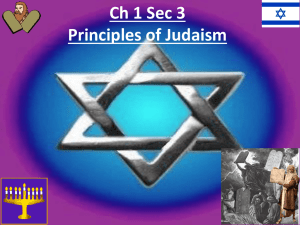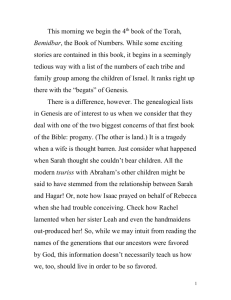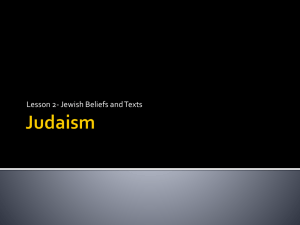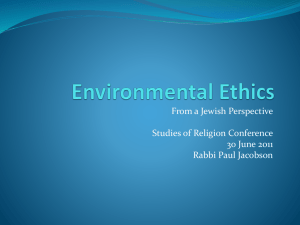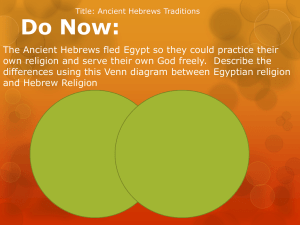a Jew by birth
advertisement
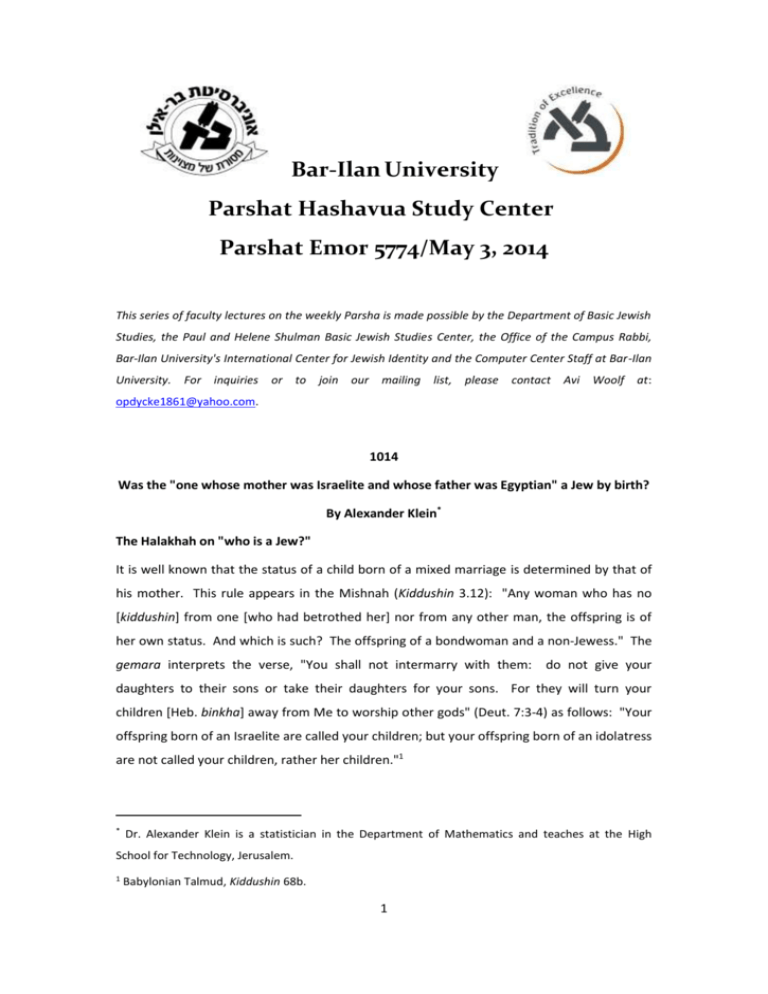
Bar-Ilan University Parshat Hashavua Study Center Parshat Emor 5774/May 3, 2014 This series of faculty lectures on the weekly Parsha is made possible by the Department of Basic Jewish Studies, the Paul and Helene Shulman Basic Jewish Studies Center, the Office of the Campus Rabbi, Bar-Ilan University's International Center for Jewish Identity and the Computer Center Staff at Bar-Ilan University. For inquiries or to join our mailing list, please contact Avi Woolf at: opdycke1861@yahoo.com. 1014 Was the "one whose mother was Israelite and whose father was Egyptian" a Jew by birth? By Alexander Klein* The Halakhah on "who is a Jew?" It is well known that the status of a child born of a mixed marriage is determined by that of his mother. This rule appears in the Mishnah (Kiddushin 3.12): "Any woman who has no [kiddushin] from one [who had betrothed her] nor from any other man, the offspring is of her own status. And which is such? The offspring of a bondwoman and a non-Jewess." The gemara interprets the verse, "You shall not intermarry with them: do not give your daughters to their sons or take their daughters for your sons. For they will turn your children [Heb. binkha] away from Me to worship other gods" (Deut. 7:3-4) as follows: "Your offspring born of an Israelite are called your children; but your offspring born of an idolatress are not called your children, rather her children."1 * Dr. Alexander Klein is a statistician in the Department of Mathematics and teaches at the High School for Technology, Jerusalem. 1 Babylonian Talmud, Kiddushin 68b. 1 All hold that when the Torah says binkha this refers to your grandchild. According to Rashi, "for they will turn…" means that they—the gentiles—will draw your grandchild to idolatry, which would be most unfortunate since the child is a Jew. Maimonides, however, understands differently: in his view, "for they will turn…" refers to the proximate case, namely when the mother is non-Jewish, and the "turning away" that is mentioned refers to the fact that your offspring will not be Jewish.2 Substantiation for this ruling also comes from the time of Ezra.3 For we read in the prophet (Ezra 10:2-3): Then Shecaniah son of Jehiel of the family of Elam spoke up and said to Ezra, "We have trespassed against our G-d by bringing into our homes foreign women from the people of the land, but there is still hope for Israel despite this. Now then, let us make a covenant with our G-d to expel all these women and those who have been born to them, in accordance with the bidding of the Lord and of all who are concerned over the commandment of our G-d, and let the Teaching be obeyed." Since "those who have been born to them" were expelled, we conclude that the children born to the non-Jewish women were considered gentiles.4 So we conclude that according to the Halakhah a Jew is someone born of a Jewish mother, regardless of the identity of the father. Many have attempted to understand the reason for 2 Mishneh Torah, Hilkhot Issurei Bi'ah 12.7. Also see Tosefot, s.v. "binkha ha-ba mi-Yisraelite karui binkha," loc. cit. 3 Thus we cannot accept David Daube's hypothesis that this halakhah was reinstituted after the destruction of the Second Temple, with the aim of legitimizing the many children who were born in the wake of Jewish women having been raped by Roman soldiers (David Daube, Ancient Jewish Law, Leiden 1981, pp. 27-28). 4 Therefore Judge Moshe Zilberg notes: "Also a historian who does not believe the Sages' words…must admit—for otherwise he would be an ignoramus—that the halakhah of matrilineal descent existed among the Jews at least from the period of Ezra (Supreme Court 58/68, Shalit v. Minister of Interior, 58/68, note 7). Daniel Friedman ("Ha-Ratzahta ve-gam Yarashta, Mishpat, Mussar ve-Hevra be-Sippurei ha-Mikra," Tel Aviv 2000, pp. 382-388) indeed acknowledges this fact but maintains that the prohibition against mixed marriages was Ezra's creation, due to the shaky political condition of the Israelites at the time. I do not think this view should be accepted, for it does not match what is said in Scripture and contradicts the words of the Sages. 2 this ruling: firstly, why should not the identity of the offspring depend on the identity of both parents; and secondly, if the status of the child is to be determined by that of one parent, alone, why not the father? After all, many rules of Halakhah in the Torah and in the works of the Sages present a patriarchal structure as the basis for other practices and laws. The characters in the Bible are for the most part introduced only according to the father's lineage, the laws of inheritance and disposition of reinforce the claim of patrilineal descent, the priesthood passes from father to son, etc. Although Rabbi Weinberg5 stresses that we do not know for certain the reasons for the commandments, he nevertheless suggests three explanations for the status of children being determined by the status of the mother: 1) Biological: the offspring is formed primarily by the mother. 2) Cultural: most of the child rearing is done by the mother. 3) Practical: the identity of the mother is known for certain, but not that of the father. Corinaldi adds one more reason:6 in his opinion, "the explanation of the riddle of the Jewish identity (of a child born to an Israelite woman and a gentile man) depends on the assumption: every child has lineage, but the Talmudic halakhah denies fatherhood to the gentile.7 So the son of an Israelite woman by a gentile is considered fatherless, forcing us to go by his Israelite mother." This explanation, however, raises a certain difficulty: if so, why does the child not go by the Jewish father when the mother is a gentile? In his opinion, Ezra legislated that the child of a gentile woman be considered a gentile, ruling contrary to what had generally been accepted up to then, namely that if the father was Jewish and the mother gentile, the children would go by the father. This hypothesis, however, is problematic. A) It does not follow from the Sages' remarks that the halakhah of matrilineal descent underwent alteration in the course of history. Nor is there any hint of this in the book of Ezra. 5 Rabbi Yehiel Jacob Weiberg, Resp. Seridei Esh, Jerusalem 1969, Part 4, p. 383. 6 Michael Corinaldi, Le-She'elat "Mi-hu Yehudi?": "Ben Isha Yisraelite" o "Ben Ish Mitzri"?, Parashat Emor, 2002, issue 72 (http://www.daat.ac.il/mishpat-ivri/skirot/72-2.htm). 7 In the words of the gemara, "the All Merciful declared their children to be legally fatherless" (Yevamot 98a). 3 B) Why would Ezra institute a ruling that so opposed accepted practice—according to Corinaldi—as to decide that a Jew should receive the status of gentile? C) Nevertheless, a person whose father is Jewish and mother gentile cannot be regarded equally as someone who is entirely gentile. Such a child is considered by certain rabbinic authorities as of "Jewish stock" and should be treated leniently in matters of conversion to Judaism.8 The case of the blasphemer The implication of the story in this week's reading is actually the opposite; that is, the son of a gentile and a Jewess is considered gentile. For Scripture says (Lev. 24:10-11): There came out among the Israelites one whose mother was Israelite and whose father was Egyptian. And a fight broke out in the camp between that half-Israelite and a certain Israelite. The son of the Israelite woman pronounced the Name in blasphemy, and he was brought to Moses—now his mother's name was Shelomith daughter of Dibri of the tribe of Dan. Who was this son of an Israelite woman? According to legend, during the Israelites' bondage an Egyptian taskmaster desired Shelomith daughter of Dibri. Early one morning, before sunrise, he kicked her Israelite husband out of the house, then returned himself and, pretending to be her husband, had intercourse with her, fathering the "son of the Israelite woman."9 The contrast between the attributions, "son of an Israelite woman," on one hand, and "Israelite man," on the other, would seem to indicate that the former was not considered an Israelite. Moreover, the legend notes that this person converted to Judaism,10 implying that conversion was necessary for him to be considered Israelite. Nahmanides, in the name of the Tzarfatim,11 explains this requirement: 8 See Yoel Shiloh, "From the 'son of an Israelite woman' to 'Jewish stock': On the Jewish Status of Immigrants from the Former Soviet Union," Bar Ilan University's Parashat Hashavua Study Center, Parashat Emor 2010. 9 Exodus Rabbah 1.28. Also see Rashi on Ex. 2:11. 10 Sifra, Weiss ed., Vienna 1862, Emor, ch. 14. 11 Chavelle (redactor of Nahmanides' commentary on the Torah) notes that he does not know who these Tzarfatim [Frenchmen?] were. 4 The reason for his proselytism was that it preceded the giving of the Torah, and his legal status followed the male in accordance with the statement that "the other peoples follow the father."12 When this child was born he was not circumcised, for he was by law an Egyptian; but when he grew up he converted of his own choice and was circumcised. The Tzarfatim believed that before the giving of the Torah, when the Israelites were still in the category of "the nations," the general rule was patrilineal descent. Nahmanides, however, does not accept this argument, for he holds that ever since Abraham was commanded regarding circumcision his family line was considered the "people of Israel," with all that is entailed thereby. If so, why does the legend speak of conversion? Nahmanides resolves this difficulty as follows: The reason Scripture speaks of "an Israelite man" and the "son of an Israelite woman" is to teach us that when a gentile has intercourse with a Jewess, the child that is born is not Jewish. Even though the gemara (Yevamot 45a) rules that when a gentile has intercourse with a Jewess the child born is Jewish [lit. "kosher"], whether the woman was single or married, still they said that the child is tainted and unfit for the priesthood, and furthermore he is not a Jew by ancestry as regards tribal affiliation and inheriting the land, for it says "according to the listings of their ancestral tribes" (Numbers 26:55). As for Torat Cohanim saying that the expression, "among the Israelites," indicates that he had converted, this does not mean that he required conversion except as all the Israelites did, entering the covenant by circumcision, ritual immersion, and sprinkling of blood when the Torah was given (Kritot 9.1); rather, it means to say that he followed his mother's ways and adhered to the people of Israel. So this is the reason it says "among the Israelites," namely, that he was with them and did not want to follow his father and be Egyptian. According to Nahmanides, the Torah means to note simply that the son of the Israelite woman was in the class of those who are "unfit for the priesthood," as follows from the gemara,13 and neither was he entitled to an inheritance in the land of Israel nor was he 12 Babylonian Talmud, Yevamot 78b. 13 The law on being "tainted for the priesthood" pertains only to the daughter of a gentile man and a Jewess: a priest is forbidden to marry such a woman. 5 permitted to pitch his tent along with the tribe of Dan. His conversion, however, was no different than the conversion of other Israelites. Nevertheless, the point of the Tzarfatim seems to be well taken: after all, Rebecca, Rachel, Leah, Osnat, Judah's wife, the wives of Jacob's sons,14 and Moses' wife Zippora were not descended of our patriarch Abraham. Incidentally, there is evidence that not all the Sages were of like mind regarding matrilineal descent. A midrash15 tells of Rabbi Haggai instructing that Jacob of Kefar Nevoraia, a Sage living in Tyre, be flogged because he wished to permit the son of a Jewish father and a gentile mother to be circumcised on the Sabbath. He based his view on the verse, "registered by the clans of their ancestral houses" (Num. 1:18), from which it clearly follows that the status of the child is determined by that of the father. Rabbi Haggai, however, told him that "he had not instructed well," rather, the ruling should be based on the verse, "do not give your daughters to their sons, etc.," cited above. Jacob of Kefar Nevoraia apparently gave in and accepted Rabbi Haggai's opinion. Moreover, an opinion is presented in the midrash that Jacob of Kefar Nevoraia was considered an epikoros [heretic].16 Thus we see that the law of matrilineal descent was generally accepted by the Sages without having to tie it to the interpretation of the verse.17 Translated by Rachel Rowen 14 Regarding Jacob's sons there is a dispute in the midrash as to whether they married their sisters or Canaanite women (see Yalkut Shimoni 143). 15 Tanhuma (Buber ed.), Hukkat 15; also cf. Jerusalem Talmud, Yevamot 2.6. 16 Ecclesiastes Rabbah (Vilna ed.), chapter 7. 17 After all, the interpretation by Jacob of Kefar Nevoraia is closer to the plain sense of Scripture than the Sages' interpretation of the verse, "do not give your daughters to their sons…" 6
